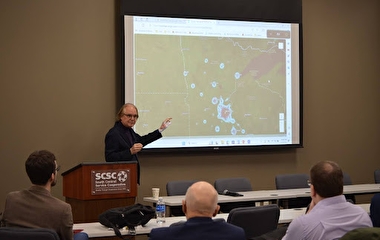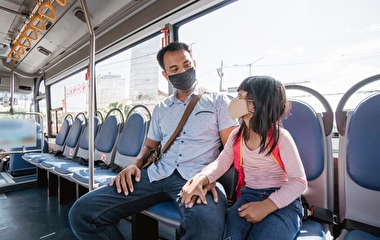In the luncheon presentation of the Symposium on the Sharing Economy, Professor Tom Fisher looked at the deeper reasons why the sharing economy is appealing to so many people, so fast—and what the transformation may mean for our daily lives.
“The sharing economy resonates in ways that are very deeply embedded in our subconscious,” began Fisher, director of the Metropolitan Design Center in the U of M’s College of Design. “Ninety percent of human history was spent in small tribal groups. The sharing economy is a reinvention of capitalism and a return to a village economy—a high-tech version of the one in which humans evolved. And it’s almost irresistible.”
With this shift will come a return to ways of living and working not seen in a very long time. “More people are becoming interested in access, not ownership, and in collaboration, not competition,” Fisher said. “We’re moving from a Darwinian framework of competition for scarce resources toward a world as a collaborative, cooperative set of ecosystems with abundance.”
Global villages—connected in an instant through technology—may become the way we identify and organize ourselves. Artisan crafts and mass customization will replace mass commodities. “The value system as a whole is becoming less about amassing things and more about memorable experiences, purposeful work, equity, and sustainability,” he said.
Travel and land-use patterns of the last century were a reasonable response to a mass production and consumption society, but the sharing economy moves in the opposite direction. “For the first time in 50 years, we’ve seen a steady decline in vehicle-miles traveled in the last eight years,” he said. “People are living closer together, closer to where they work, or working at home.”
The shared economy will continue to wring out the excess capacity inherited from the 20th century economy, Fisher said, filling empty vehicle seats and closing more retail malls. Skeptics label the shift impractical, utopian, and far off, but data show it’s not confined to millenials, and it’s happening now. “The speed with which it is emerging is remarkable,” he said.
As in previous economic transformations, there will be disruptions. Tensions are already high between car-sharing firms and cab drivers, and truckers will soon feel the impact of autonomous vehicles. The sharing economy will also challenge public policies and interrupt government revenue streams.
“The old economy is at its end game,” Fisher said. “In quite a paradox, a decidedly capitalistic economy is returning us to a village economy. We can return to a sharing economy with a new appreciation of what we’ve learned.”
A video recording of Fisher’s presentation is available on the Initiative website. Fisher’s remarks will be included in a forthcoming summary report.


